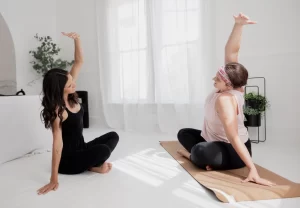Yoga has long been celebrated for its ability to promote physical and mental well-being. But when it comes to individuals who have experienced trauma, traditional yoga classes may inadvertently trigger distressing emotions and memories. This is where trauma-sensitive yoga comes into play, offering a compassionate and healing approach to yoga practice. In this blog post, we will delve into the goals and five main tenets of trauma-sensitive yoga, including choice-making, invitational language, non-coercion, interoception, and a shared authentic experience.
The Goals of Trauma-Sensitive Yoga
Trauma-sensitive yoga is a therapeutic approach designed to provide a safe and supportive environment for individuals who have experienced trauma.
THE PRIMARY GOALS OF THIS PRACTICE ARE:
- HEALING: Supporting the process of healing from trauma by integrating body-centered practices into the recovery journey.
SAFETY: Creating a physically and emotionally safe space where participants can explore their bodies and emotions without fear of judgment or retraumatization.
- EMPOWERMENT: Empowering individuals to make choices about their practice, allowing them to reclaim a sense of control over their bodies and minds.
- CONNECTION: Fostering a sense of connection and of a shared authentic experience between facilitator and participant, as well as promoting a connection between body and mind.
- SELF-REGULATION: Assisting individuals in developing self-awareness and self-regulation skills, helping them manage emotional and physiological responses to stress.
TRAUMA SENSITIVE YOGA IS BASED ON THE FIVE FOUNDING TENENTS WHICH ARE AS FOLLOWS:

- CHOICE-MAKING
The first main tenet of trauma-sensitive yoga is choice-making. In a trauma-sensitive yoga class, participants are encouraged to make choices about their practice. In traumatic situations, the victim experiences a loss of power and control and in trauma-sensitive yoga, we seek to restore this stolen power and autonomy. In a trauma-sensitive yoga class, this looks like choosing postures, modifications, whether or not to notice physical sensations, and even opting out of specific poses altogether. This emphasis on choice empowers individuals to listen to their bodies, fostering a sense of autonomy and control.
- INVITATIONAL LANGUAGE
Invitational language is a crucial aspect of trauma-sensitive yoga. Instructors use language that invites, rather than commands, participation. For instance, instead of saying, “Now, everyone must do a downward dog,” they might say, “If it feels comfortable for you, you can move into a downward dog.” This approach allows participants to feel less pressured and more in control of their practice.
- NON-COERCION
Trauma-sensitive yoga strongly promotes non-coercion. Instructors do not push participants into poses or adjustments, and physical contact, or assists, are never used. This respect for personal boundaries ensures that the practice remains safe and supportive.
- INTEROCEPTION
Interoception is the ability to be aware of and interpret signals from the body. In trauma-sensitive yoga, there is a strong focus on developing interoception. This encourages individuals to connect with their physical sensations and emotional states. By becoming more in tune with their bodies, participants can better understand and manage their responses to stress and trauma triggers. This also promotes healing of bonds between body and mind that can be shattered in moments of trauma.
- SHARED AUTHENTIC EXPERIENCE
The final tenet of trauma-sensitive yoga is a shared authentic experience. This refers to the idea that everyone in the class, including the instructor, is on a journey of self-discovery and healing. There is an acknowledgment that each individual is showing up as their true authentic self. Trauma oftentimes occurs within the context of relationships and therefore that is where healing must occur as well.
Trauma-sensitive yoga is an exciting, new approach that recognizes the unique needs of individuals who have experienced trauma. By prioritizing safety, choice-making, invitational language, non-coercion, interoception, and shared authentic experiences, this practice helps survivors of trauma embark on a healing journey that respects their autonomy and empowers them to reclaim their sense of self. If you or someone you know has experienced trauma, please point them to Therapeutic Yoga Cincy to begin their path towards healing, resilience, and restoration.
 Andree Philpot is a certified facilitator of Trauma Sensitive Yoga. Trauma Sensitive Yoga is a healing movement therapy for individuals struggling to overcome trauma and PTSD. Clinically proven to be as effective as cognitive behavioral talk therapy, Trauma Sensitive Yoga could be your missing puzzle piece to finding transformative healing.
Andree Philpot is a certified facilitator of Trauma Sensitive Yoga. Trauma Sensitive Yoga is a healing movement therapy for individuals struggling to overcome trauma and PTSD. Clinically proven to be as effective as cognitive behavioral talk therapy, Trauma Sensitive Yoga could be your missing puzzle piece to finding transformative healing.
Schedule your appointment with Andree now! Click Here!


